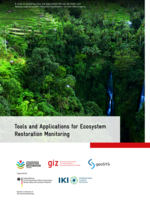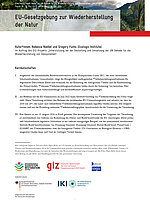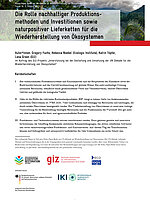Alumni of the Restoration Academy at the Global Landscape Forum in Nairobi

Alumni of the Restoration Academy presented their activities at the forum in Nairobi. The topics were deforestation-free supply chains in East Africa and biological corridors in Central America.
Eight organisations from Central America and East Africa that had taken part in the Restoration Academy presented their activities, organisations and best practice examples at the Global Landscapes Forum Nairobi. The central focus was placed on opportunities and challenges for smallholder tree nurseries and their significance for successful reforestation. The possibility of biological corridors and their role in connecting various ecosystems was also a topic of discussion.
The Global Landscapes Forum (GLF) is the largest global exchange platform for integrated, inclusive and sustainable land use. The GLF is promoting the achievement of the Paris Agreement, the United Nations Convention to Combat Desertification, and the Sustainable Development Goals.
Smallholder tree nurseries for deforestation-free supply chains in East Africa
Restoration Academy alumni from Kenya, Rwanda and Malawi discussed how smallholder farmers can generate income and contribute to deforestation-free supply chains by the cultivation of tree seedlings. The participants underlined the importance of forming cooperatives at community level. Tree nursery cooperatives can invest as necessary, and then process and market the products.
Noah Nasiali, CEO of Afarmers HortLive Media in Kenya, addresses the major challenges that resource-poor smallholder farmers have to tackle when implementing nature-based solutions: investments in seed-growing and planting material and irrigation technology, access to markets, infrastructure and transport costs and the resulting post-harvest crop losses. All of this against the background of climate change, bringing droughts and floods. Afarmers HortLive Media counts on innovative training models to impart the necessary knowledge required for the generation of a reliable income to smallholder farmers.
Annie Kairaba, founder and coordinator of the Centre for Inclusive and Sustainable Development (CISD) in Rwanda, also mentioned that the EU regulation for deforestation-free products sees smallholder farmers faced with new challenges in production for the EU market, and stressed that their perspectives need to be consistently taken into consideration in decision-making processes.
Rufo Gano Jillo, scientist at the Kenya Forestry Research Institute (KEFRI), presented an exemplary agroforestry system in Kenya, based on the fast-growing indigenous tree species Melia volkensii. Fodder plants are cultivated as secondary crops. This ensures a permanent income even prior to wood harvesting for the smallholder farmers as they can then sell their tree seedlings and fodder.
The speakers agreed that smallholder farmers require training to enable them to put such solutions into practice, and must then participate more in discussions, decision-making processes and policy-making.
Restoration of biological corridors in Central America
Alumni of the Restoration Academy from Costa Rica, El Salvador and Panama presented their organisation and their activities to promote biological corridors. Since 1997, the Central American Biological Corridor has been connecting fragmented ecosystems from southern Mexico to Panama and Colombia and is to promote the sustainable utilisation of natural resources in this region, which is a hotspot of biodiversity, thus improving the quality of life of the population.
Costa Rica has undertaken to increase its forest area to 60 percent of the country's total area by 2030 as part of this project. Henry Ramirez Molina, the representative of the Department of Natural Protected Areas (Sistema Nacional de Áreas de Conservación SINAC) in the Ministry of Environment and Energy of Costa Rica, explained that almost 1.5 million hectares of forest are to be restored for this purpose.
The El Salvador Environmental Investment Fund (Fondo De Inversion Ambiental De El Salvador FIAES) implements programmes for the protection and sustainable management of terrestrial and marine conservation areas and resources, sustainable agriculture, restoration of degraded landscapes, integrated water management and the strengthening of local economy and sustainable tourism. Mariano Pacas, the fund's technical director, explains that this also includes the introduction of agroforestry systems for fruit, coffee and cocoa in buffer zones of conservation areas. Among other projects, the FIAES supports the provision of a biological corridor for predatory cats and the protection of the forest in the Nahuaterique, conservation area in order to sustainably safeguard its ecosystem services.
Pro Eco Azuero is a non-governmental organisation (NGO) involved in the restoration of around 80 kilometres of biological corridor on Panama's largest peninsula Azuero, by means of environmental education and reforestation programmes. The endemic Geoffroy’s spider monkey, severely threatened by the loss of its natural habitat, the tropical dry forest area of the peninsula, is a symbol and popular figure. In a school programme initiated by the NGO, children learn the importance of the connection of the remaining forest areas for this species. Pro Eco Azuero also supports sustainable land management and habitat restoration by cultivating seedlings for reforestation and the creation of a seed bank with local species and varieties. The organisation's managing director, Sandra Vasquez, reported “We have already managed to achieve a change in mentality with our campaigns. There are many volunteers taking part in our reforestation campaigns.”
Restoration Academy: Support for the UN Decade on Ecosystem Restoration
The Restoration Academy is a series of workshops aiming to connect local and national implementing organisations with the UN Decade on Ecosystem Restoration (2021-2030), thus strengthening the global #GenerationRestoration movement. “The Restoration Academy was developed by means of several projects of the German Federal Enterprise for International Cooperation (Deutsche Gesellschaft für Internationale Zusammenarbeit (GIZ) GmbH), which are currently being implemented on behalf of the Federal Ministry for the Environment, Nature Conservation, Nuclear Safety and Consumer Protection (BMUV) as part of the International Climate Initiative (IKI).” The next Restoration Academy is currently in the planning phase for 2024.
The link has been copied to the clipboard
Contact
IKI Office
Zukunft – Umwelt – Gesellschaft (ZUG) gGmbH
Stresemannstraße 69-71
10963 Berlin










